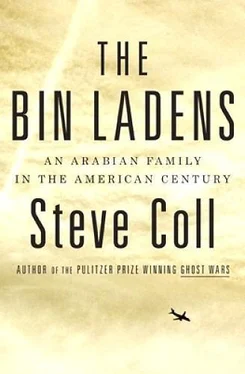Apart from his automobiles and radio sets, Abdulaziz had mainly ignored Western ideas about modernity, but his eldest son became enamored of consumer luxuries and, gradually, also became addicted to alcohol. Aramco and American government officials initially encouraged Saud’s fondness for baubles and modern conveniences. They saw him as crucial to their access to the country’s oil, and they sought to impress him with the material benefits of an American alliance.
When Saud first traveled to the United States as crown prince in 1947, he rolled into New York on a private railway car. In the observation tower of the Empire State Building, he told his hosts, “I thought my brothers were exaggerating when they told me about New York, but they didn’t tell me half enough. Such a city cannot be real.” Thereafter he peered out his limousine window, pointed at cars, and asked, “Cadillac? Buick? Chrysler?” At a gala dinner at the Waldorf-Astoria hotel, the oil men sat Saud at a table decorated with an elaborate scene of a wintertime New England village, replete with a Texaco filling station and a miniature train rolling through cotton “snow”; the train’s controls were at Saud’s place setting, and he spent the evening blowing its whistle and making the engine issue puffs of smoke. Eight acts of entertainment followed dessert, including Chinese dancing girls, magicians, and tumblers, which Saud seemed to particularly enjoy. Aramco’s goal had been to establish a lasting connection with the crown prince; they did this, but they also helped to fire the imagination of a naive man about how a proper, modern king with a large bank account might display the glory of his reign. 11
With Mohamed Bin Laden’s help, Saud constructed a $200 million palace called Nassiriyah, outside Riyadh’s old city walls. The compound became an emblem of Saud’s vulgarity, a vast campus of pink and green buildings, with soccer fields and imported American cows. A guest at one of the king’s outdoor feasts watched as Saud issued an order at sunset and beamed in satisfaction as “hundreds of colored electric bulbs burst into light…The minaret suddenly rose up flood-lit out of the dark…in all colors: blue, yellow, green and red; the palace walls were in orange.” 12
His health deteriorated as his drinking increased, and when he became concerned about his sexual potency, he surrounded himself with European quacks who sold him pills and poked him with needles. American and British diplomats clicked their tongues at Saud’s indiscipline and bad taste, but some of his impoverished subjects reveled in his seeming generosity, and they particularly appreciated his habit of tossing gold coins from his car as he drove past crowds of onlookers. Two-thirds of Saud’s subjects remained nomads or semi-nomads, and less than one in ten school-age children attended a classroom. There were less than a dozen native college graduates in the kingdom and not a university to be found, apart from the centers of Islamic scholarship in the two holy cities. 13
Saud appeased the tribes by showering them with subsidies, but he proved inept at managing his authority within the royal family. He failed to build alliances among his half-brothers and placed his unqualified sons in positions of military command, exacerbating his relatives’ fear that he might use his large brood to usurp the planned succession to Faisal.
Saud’s reign coincided with the rise of Gamal Abdel Nasser, an army officer who seized power in Egypt and called for revolution and unity in the Arab world, appeals that won him popular acclaim. Nasser’s propaganda attacked the former European colonial powers and their reactionary clients; King Saud seemed to be a conspicuous example. Saud dodged a Nasser-inspired coup in 1955; the foiled conspiracy was a shocking event in politically quiescent Arabia. The king grasped that he had to respond to Nasser’s popularity, but he lacked the necessary insight and skill. He veered erratically, embracing Nasser at one point but later participating in a botched conspiracy to murder him. 14
In Washington, President Eisenhower and his aides set out to make Saud into a staunch anti-communist ally. After Nasser nationalized the Suez Canal with Saud’s vocal support, Britain and France responded with an ill-judged invasion; after their defeat, Eisenhower saw a vacuum in the Arab world that American power might fill. He particularly coveted the use of an air base near the Saudi oil fields. In 1957 he invited King Saud to America once again, and while the dancing girls were not so conspicuous this time, the thrust of American flattery was the same; Eisenhower met the Saudi regent at the airport and escorted him beneath a banner strung across Pennsylvania Avenue: “Welcome King Saud!” 15
Yet the king’s spending careened even more out of control. His yacht was impounded in Europe over unpaid bills owed to an Italian palace architect. 16The Americans might tolerate such embarrassments, for the sake of oil and air base rights, but increasingly the king’s relatives felt they could not. Their impatience was sharpened by the presence in their midst of an obvious alternative—Saud’s frugal, taciturn half-brother.
Faisal had been born at nearly the same time as Saud, in 1905, but to a different mother, a daughter of the Al-Shaykh family, descendants of Abdul Wahhab, the austere desert preacher of the eighteenth century whose creed had so influenced the peninsula. By the early twentieth century, the Al-Shaykhs had become Nejd’s most prestigious family of religious scholars. Faisal came of age studying religious doctrine and law under the tutelage of his family’s conservative but learned scholars. He acquired the same skills of horse riding and falconry as his brother, but proved to be a more convincing and committed military leader. He was small, thin, with a prominent nose and hooded eyes, which struck visitors as those of a hawk.
Abdulaziz decided as early as 1919 that Faisal was best suited to represent the king in the distant capitals of Europe. Under Philby’s escort he traveled to England as a teenager on a long, damp winter tour that left him with early lessons in formal diplomacy, as well as powerful memories of sea lions at the London Zoo. He represented his father at the Versailles Conference, where the treaty ending the First World War was signed. Back home, Abdulaziz placed him in charge of the Hejaz, but Faisal often seemed indifferent about governing and withdrew into palace and family life. Amid the challenges of the postwar oil boom, however, he came into his own. He served as the kingdom’s representative at the infant United Nations and toured America in a style considerably more mature and businesslike than Saud. At this time Faisal was not abstemious, and he could be a lively companion ready for a practical joke, but he was never remotely as undisciplined as his half-brother. As the years passed, he became increasingly austere and religious, his demeanor dampened by chronic intestinal ailments that left him dyspeptic and gaunt.
He retained strong convictions about the Islamic faith and desert culture he had been taught as a young man. He was a fervent anti-communist and a devoted subscriber to Zionist conspiracy theories. He was also open-minded about how Saudi Arabia might adapt its traditions as it pursued a program of national development. Faisal was innately conservative, in the sense of being cautious, “an unbelievably patient individual,” in the words of the Saudi diplomat Ghazi Algosaibi. “He felt that many problems could be safely left for time to solve.” To the American officials who pressed him for change, he quoted Arab proverbs about the dangers of haste; he told them “he was anxious for the country to go ahead, but to go ahead slowly.” 17
His brother Saud’s reign appeared to require urgent attention, however. By late 1957, when yet another crisis caused by overspending left the kingdom teetering near bankruptcy, the royal family moved to install Faisal as prime minister. Reluctantly, Saud agreed. The implicit arrangement was that Saud could indulge himself, within the limits of an allowance, as a figurehead king, but Faisal would run economic and foreign policy, to restore the treasury and protect the Al-Saud from Nasserism.
Читать дальше












